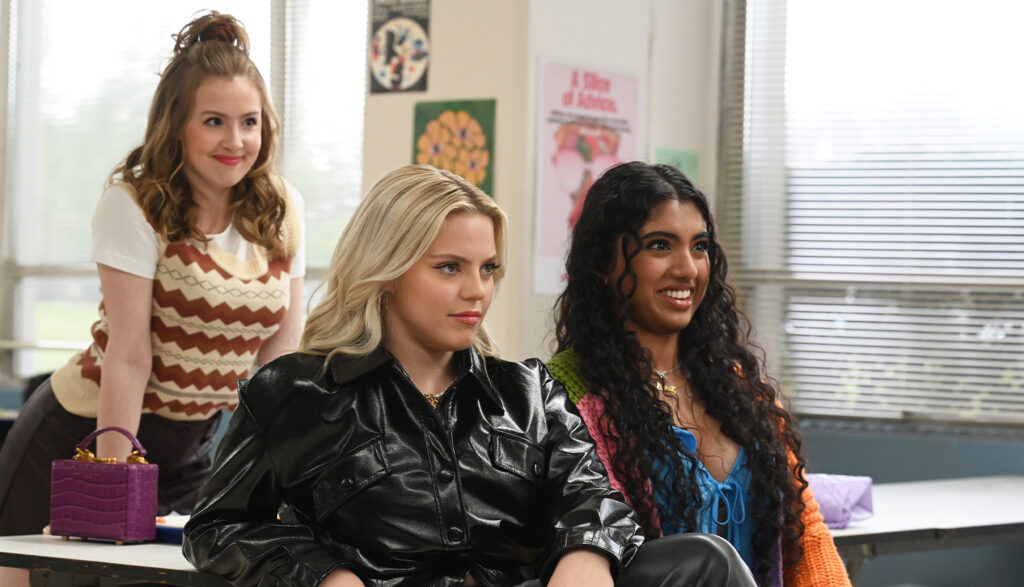Director Mark Waters’ hit high school comedy, “Mean Girls,” has gained a significant cult following since its release 20 years ago, becoming a cultural phenomenon due to its witty critique of the social structures and expectations that plague teenage girls. Former “Saturday Night Live” writer and cast member Tina Fey originally wrote the film’s sharp, endlessly quotable script, which was partially inspired by Rosalind Wiseman’s parenting advice book “Queen Bees and Wannabes.” Fey, in collaboration with composer Jeff Richmond and lyricist Nell Benjamin, has also developed the story into a 2018 Broadway musical of the same name.
The film adaptation of this musical, also titled “Mean Girls,” follows an almost identical plot to that of the 2004 movie — homeschooled teenager Cady Heron (Angourie Rice) moves from Kenya back to the United States, where she is thrust into the unfamiliar territory of North Shore High School. She quickly befriends artsy outsider Janis ‘Imi’ike (Auli’i Cravalho) and her flamboyant best friend Damian Hubbard (Jaquel Spivey), who introduce her to the cliques that form the school’s social pyramid. This includes a trio of popular girls dubbed “The Plastics,” consisting of dim-witted Karen Shetty (Avantika), insecure, approval-seeking Gretchen Wieners (Bebe Wood) and vicious queen bee Regina George (Renée Rapp).
After Regina invites her to sit with them at lunch, Cady is taken under the wing of The Plastics. Though Damian and Janis are initially excited for their new companion to give them dirt on The Plastics’ activities, things start to turn for the worse when the clique unveils to Cady a “Burn Book” in which they write cruel comments about every girl in their grade. After Regina spitefully gets back together with her ex-boyfriend and Cady’s crush, Aaron Samuels (Christopher Briney), and Cady learns of how she used to torture Janis about her sexuality, Cady resolves to get revenge on her — not realizing that she might lose sight of herself in the process.
Despite the familiarity of the story, this film is distinctly different from the original in the sense that there are musical numbers interspersed throughout, most of which are derived from the Broadway stage production. This doesn’t mean that this movie is an exact adaptation of the musical, though — many of the original songs, including “Where Do You Belong,” “Stop” and “Fearless” have been cut, while Cady’s introductory number “It Roars” has been rewritten and replaced with the pop song “What Ifs.” In fact, most of the musical numbers feel more like pop songs than show tunes, which works at some points but not at others. “What Ifs,” for example, is fine but forgettable, while Rapp’s vocals on “World Burn” will likely ring in the audience’s minds long after the movie concludes.
Unsurprisingly, Rapp is pitch-perfect as the notorious Regina, a role that she took over on Broadway before the show’s closing. She brings a confidence and nastiness to the character that would make the average high school mean girl tremble in fear. Rapp would be the highlight of the film were she in it more. Avantika, too, is hilarious as Karen, and her showstopping Halloween-themed number, “Sexy,” is by far the funniest song (and moment) in the movie. However, the film belongs to Spivey and Cravalho, the friendly but occasionally misguided narrators, who bring an infectious energy to the dynamic duo of Damian and Janis. Their new, refreshing takes on the characters are entertaining and humorous without being overwhelming.
From a directional perspective, the film is largely inconsistent. Similar to the pop song quality of the musical numbers, directors Samantha Jayne and Arturo Perez Jr., in their directorial debuts, do well at some points but not at others. For instance, the aspect ratio expansion during the long-take transition between “A Cautionary Tale” and “What Ifs” is impressive and highly effective, as it literally draws viewers into Cady’s world. Despite this, some of the other songs (most disappointingly, “World Burn”) are shot like individual music videos rather than parts of a cohesive feature film, causing a kind of cinematic whiplash as the movie cuts back and forth between dialogue and singing.
However, the biggest disappointment might be Fey’s script. Where the 2004 film was smart and funny (albeit sometimes dated or offensive), this musical adaptation feels too refined — there is no edge, no wit and a frustrating attempt to inject TikTok into every plot point. Some lines are recycled from the original, but their delivery is often clunky rather than classic. A few of the new jokes land, but not as frequently as those in the original movie or even the musical. The titular “Mean Girls” are unpleasant, sure, but the script doesn’t let them be truly mean. The performances from Rapp and Rice are perfectly catty, but it feels like they’re holding something back.
Overall, “Mean Girls” is carried by the talent in its main cast, but simply isn’t “fetch” enough to live up to the classic original comedy.



